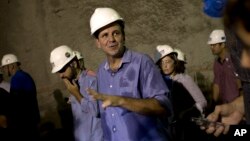Former Rio de Janeiro Mayor Eduardo Paes, the moving force behind organizing last year's Olympics, is being investigated for allegedly accepting at least 15 million reals ($5 million) in payments to facilitate construction projects tied to the games.
Paes is one of dozens of top politicians implicated in a sweeping judicial corruption investigation in which construction giant Odebrecht illegally paid billions to help win contracts.
Paes' name appears in documents published Tuesday by Brazil's top court, and could stand trial if the country's attorney general decides to prosecute.
In a statement Wednesday from his spokeswoman, Tereza Fayal, the former mayor strongly denied the allegations made in several plea bargains signed by former and present Odebrecht employees, calling the accusations "absurd and untruthful."
"He vehemently denies that he has accepted bribes to facilitate, or to benefit, the interests of the Odebrecht company," the statement said.
Paes stepped in forcefully about two years before the Olympics opened, shortly after International Olympic Committee Vice President John Coates called Rio's preparations "the worst" he'd ever seen and woefully behind schedule.
The IOC repeatedly credited Paes with speeding up preparations and cutting through red tape.
As rumors swirled around Olympic preparations, Paes often challenged reporters to find any corruption in city-hall contracts.
Days after the trouble-plagued Olympics ended, Paes and Carlos Nuzman — an IOC member and the president of the organizing committee — were awarded the "Olympic Order" by IOC President Thomas Bach.
In a statement Wednesday to The Associated Press, the IOC said Paes should be regarded as innocent until proven otherwise.
"These are allegations which he (Paes) strenuously denies," the IOC said.
Odebrecht was involved in building many Olympic-related projects, including several arenas at the Olympic Park in suburban Barra da Tijuca, a subway-line extension, and the renovation of Rio's port area.
The Supreme Court documents showed Paes received more 11 million reals ($3.5 million) in local bank accounts, and the rest in off-shore accounts.
In the statement, Paes said "he's never had off-shore accounts."
Paes left office on Jan. 1 after a term-limited eight years. He was once viewed as a presidential candidate, hoping to use the Olympics as a springboard. He recently said he hoped to run next year for governor of the state of Rio de Janeiro.
He is referred to in the Odebrecht documents as "The Little Nervous One."
Sidney Levy, the CEO of the Rio organizing committee, which operated independently from the government, repeatedly pledged his body was being run "without corruption." His name did not come up in the documents.
Plea bargains also indicate that irregularities — none of them involving Paes — were seen in awarding contracts for at least three stadiums for the 2014 World Cup: Sao Paulo, Recife and Brasilia.
In the case of the Sao Paulo stadium of Brazilian club Corinthians, plea bargains showed that Vicente Candido, a federal congressman and former official of the Brazilian Football Confederation, appeared to receive 50,000 reals ($16,000) from Odebrecht to help secure public financing.
Odebrecht built the stadiums in Sao Paulo and Recife. Brazilian constructor Andrade Gutierrez built the stadium in Brasilia.




